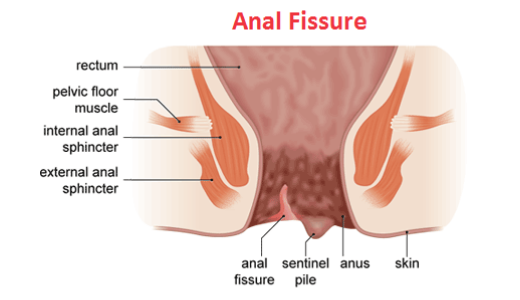Fissure Treatment In Noida

Fissure
What is an anal fissure?
An anal fissure is a cut or a tear in the thin, delicate lining of your anus.
The tear often exposes the muscle around the anus, called the anal sphincter. The damage can cause that muscle to spasm, which can pull apart the edges of the fissure even more. The spasms can cause pain and slow down the healing. Bowel movements can also keep the fissures from getting better.
An anal fissure is considered acute if it recently happened or if you've had it less than 6 weeks. It's considered chronic if it's been more than 6 weeks or it comes back often.
What are the signs and symptoms of anal fissures?
The most common symptoms of anal fissures are:
- a sharp pain when you poo, often followed by a deep burning pain that may last several hours
- bleeding when you poo – most people notice a small amount of bright red blood either in their poo or on the toilet paper
How are anal fissures diagnosed?
Your healthcare provider will ask about your symptoms and health history. Your provider will give you a physical exam. The physical exam will include your anal area.
Your provider will gently separate your buttocks. The provider will look at the area around the anus for a tear and other signs of a fissure. Where the fissure is may help find the cause. Fissures most often occur in the back center of the anus. Some occur in the front center of the anus. Fissures that occur on the sides of the anus may be caused by conditions such as Crohn’s disease. You may also have:
- Digital rectal exam. The healthcare provider puts a gloved, lubricated finger gently into your anus. A tool called a speculum may also be used. It is put into the anus and gently expanded. This allows the provider to see more of the anal area.
- Fecal occult blood test. This test checks for hidden blood in your stool.
Does surgery cure anal fissures?
If you have a chronic anal fissure that is resistant to other treatments, or if your symptoms are severe, your doctor may recommend surgery. Doctors usually perform a procedure called lateral internal sphincterotomy (LIS), which involves cutting a small portion of the anal sphincter muscle to reduce spasm and pain, and promote healing.
Studies have found that for chronic fissure, surgery is much more effective than any medical treatment. However, surgery has a small risk of causing incontinence.
What are the signs and symptoms of anal fissures? Are they painful?
Signs and symptoms of an anal fissure include:
- Pain during, and even hours after, a bowel movement
- Constipation
- Blood on the outside surface of the stool
- Blood on toilet tissue or wipes
- A visible crack or tear in the anus or anal canal
- Discomfort when urinating, frequent urination, or inability to urinate









